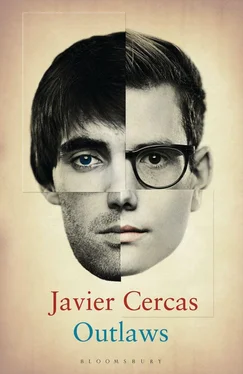‘Of course I remember.’
‘Zarco remembered too. I again felt tempted to tell him what was going on between Tere and me; for the second time I resisted. I defended myself, I don’t know what from: It was just one night, I said. Yeah, said Zarco. But you did screw her. Weren’t you scared I’d get pissed off, if you thought I was going out with her? He immediately forgot the question and qualified: Although, thinking about it, well, it must have been her who screwed you. Could be, I said, remembering how jealous I felt in the summer of ’78 because Tere slept with other guys. Anyhow, she did what she wanted and with whoever she wanted. Yeah, yeah, said Zarco sarcastically. But with you it was different, eh? I raised my eyes from the notebook and this time I looked at him without understanding; Zarco was looking at me the same way; after a few seconds he said: Don’t fucking tell me you never noticed. I asked him what he was talking about. Zarco laughed: openly. I can’t fucking believe it, he said. I already knew you were a fool, Gafitas, but I didn’t think it was that bad. I don’t know what you’re talking about, I repeated. Seriously? Zarco insisted. Seriously, I insisted. Zarco asked: You really didn’t notice that Tere had the hots for you? I was left speechless. I told you before that, during our furtive encounters at my place, Tere had reproached me more than once saying that in the summer of ’78 I had shied away from her, but I’d always taken it as an implausible joke, or an almost cruel flirtation. How could I take it any other way when my memory of that time is completely clear and in it, as I’ve told you, Tere paid no attention to me or only did very sporadically, just as she did with so many? I avoided answering Zarco’s question, but he guessed the answer from the look on my face. Fuck, Gafitas, he repeated. What a mess you were! I don’t know how I managed to change the subject — perhaps I pretended not to be concerned about it, perhaps simply that it mattered much less than the matter that had brought me to the interview room — but the thing is I managed to get our conversation back to what we were talking about before and finally, not without having to argue for quite a while longer with him, I managed to get Zarco, although reluctantly, to agree to my plan; my complete plan: including his marriage to María.
‘The first thing I did when I left the prison was to call María from my office and suggest that we meet the next day at the Royal; by phone I told her that I wanted to talk to her and that Tere would also come to the meeting. María was a bit surprised, but she didn’t raise any objections. (She was surprised because I always saw her during the week, and I told you already the next day was a Saturday, one of the days that she went to see Zarco at the prison: unlike lawyers who could see prisoners during the week, relatives and friends could only visit on weekends.) That night, at my house, I laid out the plan for Tere and told her that Zarco had agreed. Perfect, she sounded pleased. Now we just need to get María to agree tomorrow. I asked: She’ll agree, won’t she? And then, before she could ask me why I was asking, a concern that had struck me in recent days, while I talked with María at her place, occurred to me. I said: I don’t know. Sometimes I get the impression she’s not as naive as she seems, or that she only pretends to be naive to play hard to get. What do you mean? asked Tere. I don’t know, I answered. Sometimes, especially lately, she gives me the impression that she knows it’s all a farce and that we’re using her, and that at any moment she might get fed up and tell us all to go to hell. Tere dismissed my suspicions. Don’t worry, she said, trying to calm me down. She’ll agree to your plan.
‘Later, while we were dancing in the half-light of my dining room to “Bella sin alma” by Riccardo Cocciante, I told Tere what Zarco had told me at the prison. Tere laughed without letting go of me; she was dancing with her arms around my neck, her body pressed against mine, her face close to mine. It’s a lie, isn’t it? I asked. It’s true, she answered. I’ve told you a million times. Then why were you always slipping away? I asked. Why did you ignore me? Why did you go off with other guys? I didn’t slip away, Tere answered. And the one who ignored me was you. Tere didn’t throw back in my face the two times I’d stood her up, but she did remind me of the afternoon in the washrooms of the Vilaró arcade and the night on Montgó beach, and then asked me: Who went after who? You after me, I accepted. But only those two times. Then I was after you, and you slipped away, you went off with other guys. Because you ignored me, Tere repeated. She seemed like she was going to add something but she didn’t; then, in a resigned tone, almost apologetic, she added: And because I always do what I want, Gafitas. Inevitably I remembered: No ties, no commitments, no demands, each to his own. Unnecessarily I asked: Now too? Tere winked at me. Now too, she answered. And Zarco? I carried on asking. What about Zarco? she carried on answering. I always thought you were Zarco’s girlfriend, I exaggerated. Yeah I know, she said. And you weren’t? I asked. Did anyone tell you I was? she answered. Did he tell you? Did I tell you? Who told you? Nobody, I answered. So then? she asked. Just like that afternoon in the interview room at the prison while I was talking to Zarco, I remembered the love triangle in Wild Boys , but again I didn’t dare mention it (or it simply seemed inappropriate) and I didn’t answer; besides, I felt that Tere was telling the truth. I smiled. We kissed. We carried on dancing. And, as far as I recall, we didn’t mention the matter again all night.
‘The next morning Tere and I walked over to the Royal. María showed up when we’d already had our first coffee; we each ordered a second and María ordered her first and I began to explain to her and to Tere the plan to get Zarco freed. I did so pretending that I hadn’t already explained it to Tere, of course: we didn’t want María to guess what was between us, or, since she was going to be Zarco’s wife and to play a fundamental role in my plan, as well, for her to feel relegated or undervalued or for her to get jealous if she knew I’d spoken to Tere before her. Both women listened to me as we drank our coffee, Tere pretending that it was the first time she was hearing the explanation, and, at the moment when I said that Zarco and María should get married and added that Zarco was enthusiastic about the idea, a smile lit up María’s face. Really? she asked. Really, I replied.
‘I finished speaking and asked their opinions on the plan. Tere rushed to give me hers. If you and Antonio think it’s good, it seems good to me, she said. Me too, said María. Well, she corrected herself immediately, timidly. All except for one thing. What? I asked. María seemed to reflect for a moment. She had come alone, without her daughter, and, as she’d told us as soon as she sat down, later she was going to see Zarco at the prison. Although it was a sunny day, she was wearing her black overcoat, and underneath it had on a blue skirt and a speckled sweater; her hair was pulled back in a ponytail. She answered: I don’t want to talk to journalists. Why not? I asked. I feel embarrassed, she answered. Embarrassed? I asked again. Yes, she answered again. It’s scary. I don’t know how to talk. I won’t do it right. Tere should talk. Or you talk. While María was talking I remembered a comment Zarco had made that at the time I thought I’d misunderstood or that I’d taken seriously what must actually have been meant ironically (“María just wants to be in the magazines”). I summoned my patience and explained: I can’t talk, María. And Tere can’t either. You have to be the one to talk to journalists, because you’re Antonio’s companion and you’re going to be his wife, and that’s why you’re the only one who can convince them. And don’t worry; it won’t be scary: Tere and I will go with you to the interviews, won’t we, Tere? Tere said yes. María insisted. But what do you want me to convince them of? she asked with an impatient whisper. What do you want me to tell them? The truth, I answered. What you’ve told me so many times. Tell them about Antonio, tell them about your love for Antonio, tell them that Antonio isn’t Zarco any more, tell them about yourself and your daughter and your future and your daughter’s future with Antonio. María listened to me shaking her head, her eyes fixed on her empty coffee cup, her ponytail moving behind her. I won’t be able to, she repeated. Sure you will, Tere chimed in. Like Gafitas said: he and I will go with you wherever we need to and, if there’s any problem, we’ll be there to lend you a hand. Exactly, I said, and then I improvised: Besides, if you want I’ll tell you what things would be good for you to say. Or I’ll discuss it with Antonio and between the two of us we’ll tell you. That’s it: if you want, we’ll give you a sort of script and you can memorize it and say it in your own way and then, as you feel more sure of yourself, you can add your own things until eventually you’ll just be talking on your own account. What do you think? María looked up from her cup and regarded me with a mixture of curiosity and suspicion, as if asking: Are you sure? Before she could add another objection I persisted: Yes, that’s what we’ll do: Antonio and I will write down what you should say, which will just be what you’ve always said; and then you learn it and tell it in your own way. You’ll see, it’ll be really easy. María kept shaking her head weakly. She did so for a few more seconds, in silence, until she sighed and sat still.
Читать дальше












